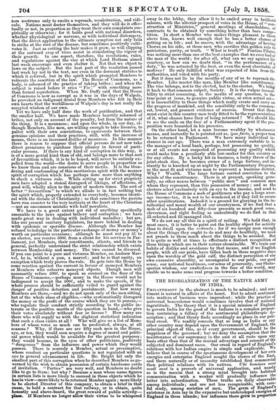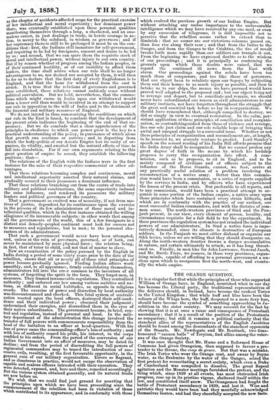THE REORGANIZATION OF THE NATIVE ARMY OF INDIA.
PHILANTHROPY in the abstract is much to be admired ; and sen- timent is natural in affairs of the heart. But to admit sentiment into matters of business were imprudent ; while the practice of universal benevolence would sometimes involve that of national ingratitude. The theory that it is a special mission of England to govern India for the good of the Indians is a complex proposi- tion containing a fallacy of the sentimental philanthropic de- scription ; and that theory finds accordingly no place in our poli- tical creed. We readily concede that so long as India or any other country may depend upon the Government of England, the principal object of this, as of every government, should be the happiness of the governed ; but we deny the assumption that the maintenance of our supremacy in the east at all rests upon any basis other than that of the mutual advantage and consent of the subjected and dominant races. Our creed in regard of England's relations with her Indian empire is simple and explicable. We believe that in course of the spontaneous development of her own energies and enterprise Ragland sought the shores of the East, and there naturally or of necessity established first commercial then political relations with its natives. Ubi homines stint modi aunt is a proverb of universal application, and nearly so is the maxim that a strong mind brought into habitual communication with a weaker will gradually influence the latter into subordination. These truths are daily observable among individuals; and are not less recognizable, with care- ful study, among societies of men. The germ Of England a existence in Asia lay in the expansive but undeveloped energies of England in these islands; her influence there grew in proportion as the chapter of accidents afforded scope for the practical exercise of her intellectual and moral superiority; her dominant power there, was eventually established upon these personal qualities manifesting themselves through a long, a checkered, and an ano- malous career, in just dealings in trade, in heroic courage in ac- tion, in mercy to the subdued, in wisdom as governors; and if her supremacy there is still to be prolonged it must be on the con- ditions that: first, the Indians still immature for self-government, and requiring to be led by foreigners, consent and desire to be led by us ; and second, that we can spare them the requisite stock of moral and intellectual power, without injury to our own country. But if by reason whether of progress among the Indian peoples, or of their continued hostility, or of our inability to afford them leaders, the time shall arrive when our rule shall be no longer advantageous to us, nor desired nor accepted by them, it will then be for us to declare that the first duty of every Englishman is to England, and that the hour for withdrawal from the east is struck. It is true that the relations of governors and governed once established, those relations cannot suddenly cease without political convulsion. But we hold, nevertheless, that the commo- tions which might ensue in India upon our withdrawal would. form a lesser evil than would be involved in an attempt to support our rule in opposition to the will of India and to the detriment of the financial and military resources of England. We do not intend in thus summarizing the conditions on which our rule in the East is based, to conclude that the development of the present crisis indicates the beginning of the end of that su- premacy. But we do conclude that a clear apprehension of the principles in obedience to which our power grew is the key to a practical understanding of the policy,. in pursuance of which alone that growth can continue or survive ; and in departing from which the body-politic of our Asiatic Empire lost its unity of or- ganism, its vitality, and awaited but the natural effects of time to fall into dissolution. For if our own arguments relating to this great question of empire be sound, they establish the following positions : that—
The relations of the English with the Indians were in the first instance for the sake of their respective commercial or other ad- vantages. That these relations becoming complex and continuous, moral and intellectual superiority asserted their natural claims, and gradually secured to their possessors a dominant influence. That these relations branching out from the centre of trade into military and political combinations, the same superiority induced the same influence, and rendered its possessors the military leaders and political governors of the country. That a government so evolved was of necessity, if not from mo- tives of justice, dependent for its continuance upon the exercise in the persons of its few administrators of those moral and in- tellectual qualities, which in the first instance obtained the willing allegiance of its innumerable subjects : in other words that among all the governments of the world, this of a few foreigners in a distant and densely-peopled continent must look for success not to measures and regulations, but to men ; to the personal cha- racters of its administrators.
That such a government would never have been attempted, and, unless at the ruin of governors, governed, or of both, can never be maintained by mere physical force ; the relation being, in fact, that of tutor to child, and not that of master to slave.
Now an examination of the policy pursued by the English in India during a period of some thirty years prior to the date of the rebellion, shows that all or nearly all of these vital principles of power became gradually ignored. Finding Indian affairs work smoothly, and, to all appearance, firmly consolidating themselves, administrators fell into the error common to the inventors of all systems, of forgetting the spirit in the form. They forgot men, in measures. They framed innumerable regulations. They centralized authority ; and enforced our law among various societies and na- tions, as different in social habitudes, as opposite in religious creeds. The exercise of poiver and discretion by local authority was discountenanced and checked. This fatal system of centrali- zation reacted upon the local officers, destroyed their self-confi- dence and their individual power ; obscured their judgment ; undermined their energies, and discredited them in the eyes of their native subordinates. The government became, in brief, cen- tral and regulation, instead of personal and local. In the mili- tary department of the administration this change involved the transfer of full powers with commensurate responsibility from the head of the battalion to an officer at head-quarters. With his loss of power came the commanding-officer's loss of authority ; and with loss of authority ceased his pride, his interest, in the corps confided to his orders. From the period of the conversion of our Indian Government into an affair of measures, may be dated its decline ; and from the period of discrediting the full powers of regimental commanders may be traced the introduction of suc- cessive evils, resulting, at the first favourable opportunity, in the general ruin of our military organization. Errors so flagrant, and so disastrous in practice, would not escape the observation of capable and zealous officers intrusted with their execution. They were detected, exposed, and, here and there, remedied accordingly. But the vicious system obtained generally, and its natural fruits are now before us. We wish that we could find just ground for asserting that the principles upon which we have been proceeding since the commencement of the rebellion had been in violation of those which contributed to its appearance, and in conformity with those which evolved the previous growth of our Indian Empire. But without attaching any undue importance to the unfavourable intelligence which we may have received by any one mail, or even by any succession of telegrams, it is still impossible not to perceive that the rebellion seems rather to extend than to diminish : that no sooner are our victorious columns passed on, than foes rise along their rear ; and that from the Indus to the Ganges, and from the Ganges to the Crishtna, the fire of revolt breaks forth more rapidly than our soldiers can trample it out. From the beginning we have expressed doubts as to the wisdom of our proceedings ; and it is principally as confirming the grounds upon which those doubts were raised, that we regard the continued ill news from the East with alarm. Our proceedings against the rebels have been too much those of conquerors, and too like those of governors. Had our object been to retaliate upon our Sepoys by subjecting them and their homes to as much injury as possible, and then to betake us to our ships, the means we have pursued would have proved well adapted to the proposed end ; but our object being not to revenge and depart, but to conciliate and remain, we should never have subordinated our reason as civil administrators to our military instincts, nor have forgotten throughout the struggle that the great and essential task before us lay in reorganization. We should have remembered that, although compelled to destroy, we did so simply in view to eventual restoration. In the calm, per- sistent application of these principles of conciliation and reorgani- zation, as contradistinguished from those of violence and revenge, lies our sole just claim and our sole reliable hope of bringing this awful and unequal struggle to a successful issue. Whether or not these principles of reorganization and reconcilement are, at length, to be resorted to, we scarcely venture to predict. Lord Stanley's speech on the second reading of his India Bill affords promise that the India Army shall be reorganized. But we cannot profess any great degree of faith in the means by. which his lordship proposes to carry this reorganization into effect. A com- mission, such as he proposes, to sit in England, and to be mainly composed of civilians and of officers subject to the influence of the Horse Guards, cannot, we fear, arrive at any practically useful solution of a problem involving the reconstruction of a native army. Better than this commis- sion would have been a commission, or a series of reports supplied by the services in India, and by officers who have experienced the lesson of the present crisis. But preferable to all reports, and to any commission, would have been a practical attempt to or- ganize in some portion of the Indian empire, a native army upon those principles which have sustained every strain hitherto, and which are in conformity with the practice of our earliest, our most successful Indian commanders, and with the dictates of com- mon sense. The north-western provinces of Sind and the Pun- jaub present, in our view, every element of person, locality, and circumstance requisite for a fair field to try the experiment. In these provinces the regulation system has not crushed the individual powers of our administrators. In Sind a native force is impe- ratively demanded, since its climate is destructive of European soldiers. In the Punjaub we must either disband or organize our Sikh levies, unless we are willing that they should disorganize us. Along the north-western frontier frowns a danger accumulative in nature, and certain ultimately to attack, as it has long threat- ened us. Finally, in men like Sir John Lawrence, General Jacob, and Mr. Bartle l rere, we possess, in those very provinces, organ- izing minds, capable of affording to a personal government a nu- cleus upon which to reorganize first the north-west, and eventu- ally the whole empire.



































 Previous page
Previous page